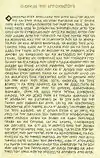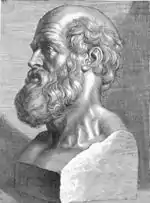Oath of Hippocrates
The Oath of Hippocrates is one of the oldest written statements of medical ethics. It is believed to have been written some time between 460 and 380 B.C.E.
Origin
The exact authorship of the Oath is not known. It is likely that it was used by a guild of physicians in Hippocratean times. It has been known in the West for centuries, first having been used in a medical school in the 16th century, and achieving common use on both sides of the Atlantic by the late 19th century. [1]
Text


“”1 I swear by Apollo Physician and Asclepius and Hygeia and Panaceia and all the gods and goddesses, making them my witnesses, that I will fulfill according to my ability and judgment this oath and this covenant:
2 To hold him who has taught me this art as equal to my parents and to live my life in partnership with him, and if he is in need of money to give him a share of mine, and to regard his offspring as equal to my brothers in male lineage and to teach them this art - if they desire to learn it - without fee and covenant; to give a share of precepts and oral instruction and all the other learning to my sons and to the sons of him who has instructed me and to pupils who have signed the covenant and have taken an oath according to the medical law, but no one else. 3 I will apply dietetic measures for the benefit of the sick according to my ability and judgment; I will keep them from harm and injustice. 4 I will neither give a deadly drug to anybody who asked for it, nor will I make a suggestion to this effect. Similarly I will not give to a woman an abortive remedy. In purity and holiness I will guard my life and my art. 5 I will not use the knife, not even on sufferers from stone, but will withdraw in favor of such men as are engaged in this work. 6 Whatever houses I may visit, I will come for the benefit of the sick, remaining free of all intentional injustice, of all mischief and in particular of sexual relations with both female and male persons, be they free or slaves. 7 What I may see or hear in the course of the treatment or even outside of the treatment in regard to the life of men, which on no account one must spread abroad, I will keep to myself, holding such things shameful to be spoken about. 8 If I fulfill this oath and do not violate it, may it be granted to me to enjoy life and art, being honored with fame among all men for all time to come; if I transgress it and swear falsely, may the opposite of all this be my lot.[2] |
Explication

- Paragraph 1: As was usual in ancient times, the cult/guild's patron/patroness deities are invoked.
- Paragraph 2: This maintains the secrecy of the cult/guild, and establishes a secret brotherhood.
- Paragraph 3: Not much mystery here.
- Paragraph 4: An injunction against euthanasia and abortion.
- Paragraph 5: A vow to avoid surgery, especially for kidney stones, and to defer to people of higher expertise (should they exist).
- Paragraph 6: Boundaries. Don't sleep with the patients.
- Paragraph 7: Confidentiality.
- Paragraph 8: More swearing.
Modern Usage
The Oath is ancient and specific. It was used by a particular medical sect at a particular time. Still, there is a desire on the part of physicians to take an oath. It is tradition and it helps to reify the quasi-sacred status of medicine in our culture.
Given the nature of the oath, it is nearly always modified when used at all. For instance, the oath to the sect's deities is often left out. The prohibition against surgery is also often dropped. Sometimes the oath is dropped completely in favor of other ceremonies. (See the Oath of Maimonides.)
The most controversial portions, those proscribing euthanasia and abortion, are sometimes left out, sometimes included, and usually thoroughly discussed. Given that this oath applied to specific people at a specific time, it does not provide that much guidance for current behavior and practice. Much of the advice is very good, and still used (such as confidentiality and maintaining boundaries with patients). Others are better examined using modern mores and ethics.
Contrary to the beliefs of some, the Oath has not been modified to mollify "abortionists". The Oath, when given, is usually modified in many ways, including the removal of prohibitions against legal medical procedures. For example, far more institutions leave in the prohibition against euthanasia (which is mostly illegal) and leave out the prohibition against abortion (which is largely legal).[3]
The Oath, where used, is purely traditional and symbolic. It is not binding in any way. It is useful in that it often creates debate and discussion about medical ethics among medical students. It is not a tool or plot by any particular political force. Medical students are free to take or not take any oaths they wish.
References
- Markel, H. “I Swear by Apollo” — On Taking the Hippocratic Oath. New England Journal of Medicine.350;20. May 13, 2004.
- Paragraph numbers added by editor
- http://www.ama-assn.org/amednews/site/free/prsb0220.htm